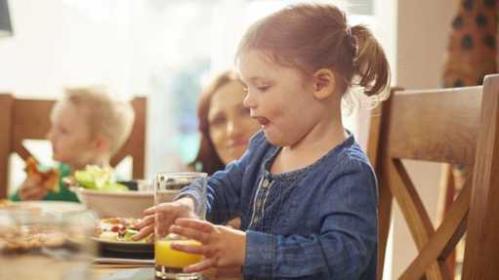导读:人们不再喜爱橙汁?橙汁做早餐到底健不健康?最大的橙汁生产国巴西如今地位岌岌可危。

Brazil is the world’s biggest producer of both oranges and orange juice, but changing breakfast tastes, especially in Europe, mean the country’s reliance on the fruit may have to change.
巴西是世界上最大的橙子和橙汁生产国,但是想要改变人们早餐的口味,特别是在欧洲地区,意味着这需要改变一个国家对水果的依赖程度。
Marco Antonio dos Santos says he was not born under an orange tree. But that’s about the only event in his life not linked to oranges, he jokes.
马可·安东尼奥·多斯桑托斯开玩笑说,不是在一棵橙树下出生是他生命中唯一不与橙子相关的事。
The 54-year-old is from the city of Taquaritinga, in the state of Sao Paulo. He has dedicated his entire life - as have several generations of his family before him - to making Brazil the world’s largest producer of the citrus fruit.
他已经54岁了,来自圣保罗州的塔夸里廷加市。他就像他的家里几代人一样,一生奉献在使巴西成为世界上最大的柑橘水果生产国的事业上。
And it has paid off. One in every three oranges in the world is now grown in a relatively small area in the states of Sao Paulo and Minas Gerais.
当然他的努力已经得到回报了。世界上每三个柑橘中就有一个产自圣保罗州和米纳斯吉拉斯州的这片相对较小的地区。
Half of all orange juice drunk worldwide is from Brazil too.
世界近一半橙汁都产自巴西。
The country’s unquestionable global dominance would suggest that orange producers like Mr Santos have little to worry about, but recent numbers suggest otherwise.
该国毫无疑问的全球统治地位本应该让像桑托斯先生这样的橙子生产商几乎不用愁,但最近的数字让人有些怀疑了。
"about 15 years ago, I remember we had about 20,000 orange producers in our region. Now we are down to about 6,000," says Mr Santos.
桑托斯先生说:“大概15年前,我们地区有大约20000个橙子生产商,现在只有6000左右。”
Much of the decrease can be linked to changes in breakfast tastes, particularly in Europe, putting the future of what was once the world’s most dominant breakfast beverage in jeopardy.
减少的主要原因可能与早餐口味的变化有关,特别是在欧洲,这使得橙汁这种曾经是世界上最主要的早餐饮料的未来岌岌可危。
By the 1980s, Brazilian orange producers had achieved a global dominance that remains to this day.
从八十年代开始,巴西的橙子产业已经成功占据全球的统治地位,并一直维持至今。
Giant Brazilian juice firms Cutrale and Citrosuco built factories in the US and Portugal as well as modern terminals in major ports such as Ghent and Rotterdam. The scale and low costs achieved by these investments made it virtually impossible for new players to rival them.
巨型巴西果汁公司Cutrale和Citrosuco在美国和葡萄牙建立了工厂,也在如根特和鹿特丹等主要港口建立了现代化码头。这些投资所实现的规模和低成本运转使得无人可以与之竞争。
Yet increasingly Brazil’s dominance in the sector is becoming a hindrance.
然而,巴西在该行业的优势正在一步步成为阻碍。
One problem is that it puts too many oranges in only one basket: the external market. More than 95% of its production is shipped abroad, the majority of it in the form of orange juice.
一个问题是,国外市场是巴西橙子的主要去处。其95%以上的产品出货到国外,大部分是以橙汁的形式。
"If you take the Brazilian meat industry, for example, they only export about 20% of their production. The other 80% is sold domestically. So they are never too exposed to problems abroad."
“例如,巴西肉业的出口只占约20%的生产量,另外80%在国内销售,所以他们很少会遇到因国外情况的改变而产生的问题。”
But turning towards their home market wouldn’t solve the problem for orange producers either, because Brazilians just don’t drink enough orange juice.
但是,如果转向国内市场也不会解决橙子生产商的问题,因为巴西人不喝那么多橙汁。
In Brazil a typical individual drinks just 15 litres a year compared to the 22 litres of an average European or American.
在巴西,每个人每年只喝15升,而欧洲或美国的平均水平为每人22升。
But the biggest threat to Brazilian orange producers is that orange juice has become less popular in Europe, especially in the UK.
对巴西橙子生产商来说,最大的威胁在于,在欧洲,特别是在英国,橙汁已经不那么受欢迎了。
"Modern life has a new rhythm and many people are now skipping breakfast, or getting drinks on the go. The cereal industry is facing the same issue," says Mr Netto.
Netto先生说:“现代生活节奏在变化,许多人现在跳过早餐,或者就在上班途中喝一杯饮品,所以谷物业也面临同样的问题。”
Fruit juices are also losing their reputation as a healthy option, with some nutritionists claiming they can be as unhealthy as fizzy drinks.
一些营养学家表示果汁像碳酸饮料一样不健康,这也使得人们认为果汁不再是健康的选择。
One winner in the "juice battle" is coconut water, which has less than half the calories of orange juice.
“果汁大战”中的一个赢家是椰子水,因为其热量不到橙汁的一半。
Despite changing trends, orange is still juice drinkers’ preferred choice and has a 30% market share.
尽管在发生这些变化,但橙汁仍然是喝果汁的人的首选,其市场份额为30%。
Many in Sao Paulo and Minas Gerais have already abandoned orange production, with some now planting lemons and guava.
圣保罗和米纳斯吉拉斯州的许多人已经放弃了橙子生产,有些人现在种植柠檬和番石榴。
In 2015,Cutrale bought US banana company Chiquita to try to diversify.
2015年,Cutrale收购了美国香蕉公司Chiquita,试图使得产业多元化。
But Mr Santos and other traditional orange growers are not willing to lose a fight their families have fought for generations.
但桑托斯先生和其他传统的橙子种植者不愿意放弃他们家族几代人为之奋斗的事业。
"Things will never go back to being what they used to be like. We won’t ever have that many mouths for our oranges anymore. But the market is reaching a new equilibrium."
“永远不会像以前那样了。不会再有那么多人喜爱橙子了。当然,这个市场也正在到达一个新的平衡。”